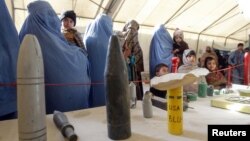ISLAMABAD, PAKISTAN —
More than 1.6 million Afghan refugees registered in Pakistan are due to be repatriated by the end of the year. With just three weeks to go, however, a recent United Nations survey found that roughly 80 percent have no intention of returning to Afghanistan.
According to the U.N. survey, most Afghan families living in Pakistan feel Afghanistan is just not safe enough to go back home. Others cited the inability to earn a living and the lack of anywhere to live in their native country.
Pakistan's Minister for States and Frontier Regions Shaukat Ullah acknowledged the challenges involved in convincing refugees to return to their country after decades of living in Pakistan.
"After 32 years, if a person is returning from a country where he has been born and he is going to a country like Afghanistan, they will think 100 times," said Ullah.
Sizable refugee population
Since the Taliban takeover of Afghanistan in the 1990s, Pakistan has hosted one of the largest refugee populations in the world. Some 3.8 million have crossed back over the border into Afghanistan.
The UNHCR has offered plastic buckets, soap, blankets, cash and a one-way ticket for those still living in Pakistan, and succeeded in encouraging another 72,000 people to return to Afghanistan this year.
But there still are 1.6 million official Afghan refugees here. UNHCR representative Neill Wright said the organization was waiting to hear what Pakistan has planned for these refugees after the December 31, 2012 deadline.
"I know that the government is very actively engaged in considering what its policy will be in terms of the management of Afghan refugees in 2013, and in terms of supporting this continued partnership that we have with Afghanistan over voluntary repatriation, and I look forward to hearing what that strategy will be," said Wright.
Determining a plan
Responding to concerns that there will be another wave of refugees from Afghanistan after international combat forces leave the country in 2014, Wright said contingency plans are under consideration.
"This is clearly an issue that I am involved in discussions with many people, senior politicians, people in Afghanistan, members of the international community. Of course, when you do contingency planning, you look at a worst-case scenario and you look at a best-case scenario, and if you are sensible you will probably look at something in the middle," said Wright.
He declined to give any further details.
Many Afghan refugees live in very poor conditions in Pakistan. According to the UNHCR, less than one quarter of them work, and almost three quarters of Afghan children are not going to school.
According to the U.N. survey, most Afghan families living in Pakistan feel Afghanistan is just not safe enough to go back home. Others cited the inability to earn a living and the lack of anywhere to live in their native country.
Pakistan's Minister for States and Frontier Regions Shaukat Ullah acknowledged the challenges involved in convincing refugees to return to their country after decades of living in Pakistan.
"After 32 years, if a person is returning from a country where he has been born and he is going to a country like Afghanistan, they will think 100 times," said Ullah.
Sizable refugee population
Since the Taliban takeover of Afghanistan in the 1990s, Pakistan has hosted one of the largest refugee populations in the world. Some 3.8 million have crossed back over the border into Afghanistan.
The UNHCR has offered plastic buckets, soap, blankets, cash and a one-way ticket for those still living in Pakistan, and succeeded in encouraging another 72,000 people to return to Afghanistan this year.
But there still are 1.6 million official Afghan refugees here. UNHCR representative Neill Wright said the organization was waiting to hear what Pakistan has planned for these refugees after the December 31, 2012 deadline.
"I know that the government is very actively engaged in considering what its policy will be in terms of the management of Afghan refugees in 2013, and in terms of supporting this continued partnership that we have with Afghanistan over voluntary repatriation, and I look forward to hearing what that strategy will be," said Wright.
Determining a plan
Responding to concerns that there will be another wave of refugees from Afghanistan after international combat forces leave the country in 2014, Wright said contingency plans are under consideration.
"This is clearly an issue that I am involved in discussions with many people, senior politicians, people in Afghanistan, members of the international community. Of course, when you do contingency planning, you look at a worst-case scenario and you look at a best-case scenario, and if you are sensible you will probably look at something in the middle," said Wright.
He declined to give any further details.
Many Afghan refugees live in very poor conditions in Pakistan. According to the UNHCR, less than one quarter of them work, and almost three quarters of Afghan children are not going to school.





